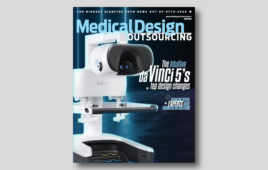
Dr. Taha Kass-Hout is the chief medical officer and director of machine learning at Amazon Web Services [Photo courtesy of Amazon]
The cloud computing business at Seattle-based Amazon.com (Nasdaq: AMZN) is the largest player in the industry, with control of about a third of the market and a significant lead over cloud competitors Microsoft and Google.
Dr. Taha Kass-Hout, the chief medical officer and director of machine learning at AWS, spoke with Medical Design & Outsourcing as part of an ongoing series of conversations about cloud computing’s contributions to medtech and the potential ahead.
“The future is bright for anyone who’s trying to solve problems in healthcare and life science globally,” he said.
This conversation has been edited for clarity and length.
MDO: What do you do at AWS?
Kass-Hout: My role involves the intersection of understanding customer problems and healthcare, life sciences and genomics customers, as well as payers and how the cloud in general, data services, machine learning and AI services can help them adopt the cloud in ways that help solve those problems. I’ve been at Amazon for the last five years now.
MDO: How long have you been in the medical and technology industries?
Kass-Hout: Gosh, over 27 years now. It’s been a long time. I also served in the Obama administration’s second term in the FDA as chief health informatics officer and led many developments that involve the cloud and as well as machine learning and ways to use innovations to advance regulatory science as well as advances in manufacturing, advances in medical devices and drugs and postmarket surveillance and using big data and AI to help with that.
MDO: What are some surprising and inspirational examples of what cloud computing enables with regard to medical device design, manufacturing and capabilities/performance?
Kass-Hout: Ambra Health used AWS to expand its software as a service medical imaging data platform to five new countries in order to meet strict data security requirements. Butterfly Network is an innovator with Butterfly iQ, one of the first handheld whole-body ultrasound systems that uses AWS for making medical imaging universally accessible and affordable, providing a personalized experience for healthcare providers at drastically lower cost. We’re seeing more and more innovation, especially spurred by COVID-19. That really helped accelerate the adoption of the cloud and appreciation of the scale and how you can start closing gaps in care globally.
MDO: What are some previously unthinkable advances that now seem increasingly likely to become a reality?
Kass-Hout: Look at Moderna. Moderna was born in the cloud, but when they were founded, they recognized that if mRNA works for one application, it will work for countless more. You just need to change the information or the programming encoded to the new application, basically to the cells. So they purposely designed the company with a platform approach, and that really moved the needle in the industry from a bespoke approach to more of a platform approach, where they didn’t design for one disease or even one therapeutic area. They built with intention of targeting countless diseases. That led them to design their processes to be high throughput, and they integrated digital health and AI algorithms in order to accelerate their R&D cycles and give them unprecedented scale all the way to automating logistic decisions such as manufacturing with intelligent sensors and demand forecasting. But what’s really neat is its work on the vaccine for the novel coronavirus genetic sequence. When that was made available, within only a few days they were able to finalize the sequence for its RNA vaccine in partnership with the National Institutes of Health. And then, they started manufacturing the first clinical grade batch of vaccines within two months of completing the sequencing. A process that historically has taken up to 10 years, we’ve seen now they’re able to do that in days or weeks. And at the end of the year, the same design of the protein that was approved by or authorized by the FDA is the same thing they came up with earlier in the year. So you can really see how they’re enabling rapid experimentation cycles of the design of mRNA and DNA sequencing and automating quality control data analysis, saving countless [hours] of manual review and how they’re really revolutionizing this field. And now they’re taking the same they’ve done for the vaccine into cancer therapeutics treatments and personalized vaccines for cancer.
MDO: What does cloud computing mean for how medical device designers and engineers should be thinking?
Kass-Hout: Health systems produce petabytes of unstructured data every day, and it’s growing exponentially. So if you want to start organizing the information in order to design around it, this massive information comprises clinical documents, lab reports, imaging reports, handwritten reports and forms, and tables like insurance claims. Then you look at more broadly medical devices as well as monitoring devices generating petabytes of data every day, medical imaging and all sort of forms and formats of health data. This data is not easy to use or analyze, and at the moment 97% of this unstructured data is unused since it’s difficult to structure and index and analyze. The cloud is helping a lot of these organizations make sense of all this data in order to provide the biggest opportunity to transform care. This transformation will primarily depend on data flowing where it needs to go. It all comes down to interoperability.
MDO: What sort of big, futuristic dreams do these or other advancements inspire?
Kass-Hout: Equity in care. How are we able to take all this information to provide more equitable care? Healthcare is a $7.5 trillion business globally, yet more than 4 billion people don’t have access to care — forget about high-quality care, just access to care in general. I believe AI and technology have to be part of a solution to creating that more equitable access. The future of healthcare is so vibrant and dynamic right now. It’s so dependent on big data, on AI and on cloud computing. Promising innovations like precision medicine, conversational chat bots, intelligent scribes, and APIs for data and interoperability may make healthcare better and more efficient and more equitable in the future.
Read more from our conversations with leaders at companies such as Johnson & Johnson, Microsoft, Philips, Google, GE Healthcare and Delta Development.




![A photo of the Medtronic GI Genius ColonPro polyp detection system flagging a potential sign of colon cancer during a colonoscopy. [Photo courtesy of Medtronic]](https://www.medicaldesignandoutsourcing.com/wp-content/uploads/2024/04/Medtronic-GI-Genius-doctors-268x170.jpg)